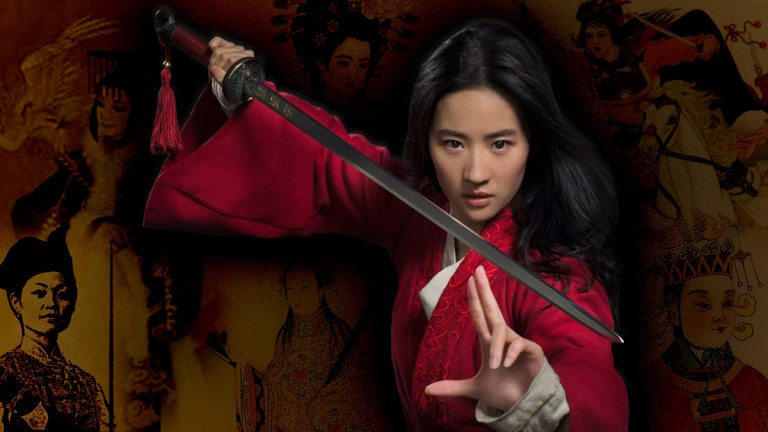Mulan And The Chinese Women Warriors of History and Legend
Mulan is the most widely known of girl Chinese warriors, but other historical and legendary female heroes in Chinese history are worthy of discussion too.

While American audiences know the story of Mulan through the 1998 animated Disney film and the upcoming live-action reboot, they may not know that the films are based on a Chinese legend. Hua Mulan is a legendary figure whose story was first told in “Ballad of Mulan,” a folksong first transcribed in the 6th century. In the legend, Mulan is a girl who disguises herself as a man and goes to war in place of her father. Mulan fights for many years as part of the army and, after earning much honor and gifts from the emperor, returns home to her family. Only then does she reveal her gender identity.
While Mulan may be the most familiar of woman Chinese warriors (at least to American audiences), she’s only one in a rich history of historical and legendary female heroes in Chinese history. With the live-action adaptation of Mulan releasing on Disney+ this Friday, here are some of the highlights you might encounter when brushing up on your Chinese legends and history—figures who perhaps warrant their own feature film adaptation…
Xun Guan
At thirteen, Xun Guan was already an accomplished martial artist and tactician. Her father, Xun Song, was the governor of Xianyang in the late 200s A.D. One night, when the castle was under siege, Xun Song was ready to lead a force against the opposing soldiers. Convinced that her father leaving the castle would be bad for morale, she proposed that instead she lead a group of elite soldiers out to defeat the enemy. Even though she was only thirteen, Xun Gun had her father’s trust, and he sent her out. Once outside the walls, Xun Guan immediately spotted a weak spot in the enemy’s position, and she and her troops were triumphant against them, successfully allowing the castle to hold out until more reinforcements could arrive.
Pingyang
During much of Pingyang’s lifetime in the early 600s, the emperor, Yangdi, was incompetent, greedy, and vain—he’s become a villain of Chinese history. Pingyang was the daughter of military commander Li Yuan, and became the wife of Chai Shao, the leader of Yangdi’s palace guard. Yangdi decided that Li Yuan was just too good at his job, so he trumped up false charges and had Li Yuan arrested, only to realize that Li Yuan was the only person who could protect Yangdi from people who actually were plotting against him. Yangdi released Li Yuan, but the damage was done: now Li Yuan wanted Yangdi dead, as well. As Li Yuan rebelled, Chai Shao and Pingyang had to decide how both of them could safely support her father; Chai Shao left first to openly join Li Yuan’s rebellion, and Pingyang later escaped on her own, braving the danger because she was confident she could hide in plain sight.
She journeyed back to her family’s lands and threw open the larders, endearing the people to her and recruiting the first members of what would become known as the Army of the Lady, or the Woman’s Army. As the war continued, Pingyang made alliances and built an army 70,000 strong, keeping them all under a strict code of conduct the prohibited looting, raping, and pillaging. Where the army went, they brought food with them to feed the locals, so they were greeted as liberators. Yangdi dismissed Pingyang as a threat (she was just a woman, after all!), until it was far too late; her forces were unhindered by Yangdi’s troops, and they joined up with Li Yuan and Chai Shao for the final attack on the capital—and, in their victory, the establishment of the Tang Dynasty.
Wu Zetian
In the late 600s, China had a woman emperor. Depending on which historical records you read (the sources tend to be very biased against or very biased toward the empress), she lied, cheated, and murdered her way to the throne—and did more of the same to stay there. She started her imperial career as the favorite concubine of Emperor Taizong. When he died, she married his son, the new emperor, Gaozong. Some sources imply that a romance was going on long before the old emperor’s death; others suggest she was so good at courtly intrigue that Gaozong kept her by his side and ruled equally with her, relying on her political savvy. After Gaozong’s death, their children were in line for the throne; Wu poisoned the eldest, exiled the second, and had plans to manipulate the third and continue to rule. When that son showed too much backbone (and made too many other courtiers angry), she had him deposed, replaced him with his younger brother, and then eventually deposed that child, too, taking on the mantle of rule for herself. Though her rule as emperor was short, she made a number of state improvements in religion, literature, and education—and some historians credit those changes with still having an influence on modern Chinese scholarship.
Liang Hongyu
Although she started her career as a musician, Liang Hongyu ended up using her instrumental skills for a more military purpose. She is said to have met her husband, military officer Han Shizhong, when she was performing as a singer and drummer for his troop. They married in 1121, and she later fought by his side as the army pushed back an invasion by the Huns. The drumming comes in because, during that era, commands were sent to different units in the military through flags and drum signaling. Her drummed orders (and the strategy she came up with) are credited with leading a group of only 8,000 soldiers to victory against a force of 100,000 Hun warriors.
Qin Liangyu
Fighting against the Manchus was a family experience for Qin Liangyu, who went to war alongside her brothers in the early 1600s. When the Manchus—from beyond the Great Wall—threatened Beijing, Qin Liangyu led troops from Sichuan to defend the capital. But there were also rebel forces within the Ming Dynasty, and Qin Liangyu fought against them as well, alongside her son, Ma Xianglin. There’s not just one story of Qin Liangyu’s successes; she fought so many successful campaigns that the Chongzhen Emperor appointed her Crown Prince’s Guardian and a title equivalent to marquis. When the Ming Dynasty fell during Qin Liangyu’s later years, she remained in control of an area of Sichuan, where she helped settle 100,000.
Wu Mei
Women in martial arts are common enough in modern schools (and modern film), but they’ve been around much longer! In fact, the founder of the famous kung fu style Wing Chun was one of the legendary five elders of Shaolin Martial Arts, was a woman. Buddhist nun Wu Mei (also known as Ng Mui) survived the destruction of the Shaolin Temple of Dengfeng during the Qing Dynasty. The shaolin practitioners had been accused of anti-Qing activities, and the army went to destroy them for it. In the bloody battle that followed, only the five known as the five elders survived. They’re credited with spreading martial arts across China, and Wu was said to have invented some of the most important styles. Her Wing Chun is possibly the best known of these, named after Wu’s first student—also a woman—Yim Wing Chun.
Ching Shih
In the early 1800s, when the Golden Age of piracy had already faded in the Caribbean, a pirate queen was sailing her fleet, commanding as many as 80,000 outlaws (sources differ), in the South China Sea. History has forgotten her birth name—Ching Shih translates to “widow of Ching”—but not her amazing deeds, which have put her down in the history books as one of the most successful pirates in history. Ching Shih worked as a prostitute until she married the notorious pirate Cheng I (who was reportedly impressed with her shrewd business sense), who had united different factions of pirates into his Red Flag Fleet.
Legends say that she required half the fleet to belong to her as a condition of the marriage, and when Cheng I died six years later, she took control of the entire fleet. She kept order by enforcing a strict pirate code, and though the Qing dynasty officials, Portuguese Navy, and the East India Company all tried to defeat the fleet, she ruled the waves, only ending her piratical activities when she was offered amnesty from the Chinese government. She lived until she was 69, and she’s the inspiration behind Mistress Ching, one of the Pirate Lords in the Pirates of the Caribbean franchise.
Yu Shu Lien and Jen Yu
These two are completely fictional, but as far as pop culture goes, these women warriors cannot be left out. In the film Crouching Tiger Hidden Dragon, Jen Yu (played by Zhang Ziyi) is a teenager and an amazing martial artist who has been secretly trained by the villainous Jade Fox, under the nose of Jen’s father, the governor. Yu Shu Lien (played by Michelle Yoeh) owns and runs a private security company; she’s close friends with Li Mu Bai, and she agrees to go with him to take his sword, the Green Destiny, as a gift to a benefactor. When the Green Destiny is stolen, they track it to Governor Yu’s mansion. Eventually, Jen Yu is discovered as the thief, but her youth and talent make both Li Mu Bai and Yu Shu Lien sympathetic to her, even after they realize she’s been taught by Li Mu Bai’s enemy, Jade Fox. Later in the film, Yu Shu Lien tries to teach Jen Yu a lesson, and the two have one of the best choreographed multi-weapon epic martial arts movie fights in the history of martial arts movies.
Aero
Another fictional Chinese hero is Aero, Marvel’s manhua series star. When she’s not being a superhero, Lei Ling is an architect in Beijing. When the monsters start coming, however, she takes to the sky as Aero, the protector of her city. Using powers of manipulating winds and air currents, she struggles with the destruction caused by supervillains, because her passion is for building and creating, not for seeing things torn down. The character was first introduced in the Agents of Atlas comic, but she started starring in her own ongoing comic series in 2019. It’s too much to hope that we’ll get a hint of her in the MCU’s upcoming Shang Chi, but the ongoing series, written by Zhou Liefen with stories by Alyssa Wong and Greg Pak, and art by Keng and Pop Mhan, is definitely worth picking up.
Honorable Mention: Cassandra Cain
I didn’t know this when I watched Birds of Prey (and the Fantabulous Emancipation of One Harley Quinn), but Cassandra Cain—the thief kid who swallows the film’s macguffin—has a long and awesome history in DC comics. She’s a first generation Chinese American; her mother, Lady Shiva, is a dangerous assassin who fled from her village, and her father, David Cain, is one of Ra’s al Ghul’s henchmen. It’s not a love match—he blackmails her into having his child, and then he raises Cassandra to be the perfect assassin and bodyguard. But when she was just eight years old, her empathy made her reject a path of killing, and she ends up in Gotham, where she saves Commissioner Gordon’s life and becomes Batgirl. In fact, Cassandra Cain was the first Batgirl to have her own standalone series run (in 2000). Eventually, after a series of twists and turns, she takes a gig working as one of the global team of Batmen as the Black Bat, where she fights crime in Hong Kong. It’s hard to imagine the Birds of Prey version matching up, but I’d love to see that character in more DC movies!
Mulan premieres on Disney+ on September 4th. Find out how and when you can access it here.
